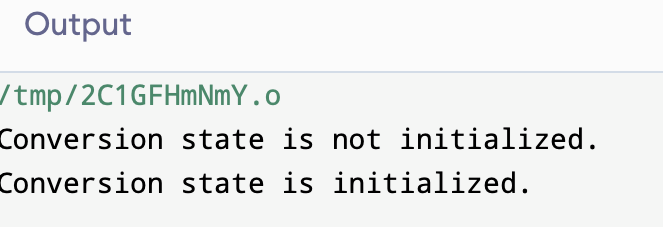C++ Tutorial
C++ Control Statement
C++ Functions
C++ Arrays
C++ Pointers
C++ Object Class
C++ Inheritance
C++ Polymorphism
C++ Abstraction
C++ Namespaces
C++ Strings
C++ Exceptions
C++ Templates
Signal Handling
C++ File & Stream
C++ Misc
C++ STL Tutorial
C++ Iterators
C++ Programs
MCQ
Interview Question
mbsinit() Function in C/C++In this article, you will learn about the mbsinit() function in C++ with its syntax and examples. What is the mbsinit() function?In C/C++, the mbsinit() function is found in the header of the Standard C Library. If a multibyte conversion state object is not in its initial state, it can be determined using this function. Multibyte character encodings like Shift-JIS and UTF-8 are commonly linked to the multibyte conversion state object. Syntax:This is the mbsinit() function's prototype:
Example:Let us take an example to illustrate the use of the mbsinit() function in C. Output: 
Explanation: In this example, the wide-to-multibyte conversion using the wcrtomb() function is tested both before and after to see if the multibyte conversion state object (state) is in its initial state using mbsinit(). The behavior of multibyte character encoding functions can be impacted by setting the locale to the default locale using the setlocale() function. Example 2:Let us take an example to illustrate the use of the mbsinit() function in C++. Output: 
Next Topicmultimap key_comp() in C++
|
 For Videos Join Our Youtube Channel: Join Now
For Videos Join Our Youtube Channel: Join Now
Feedback
- Send your Feedback to [email protected]
Help Others, Please Share










